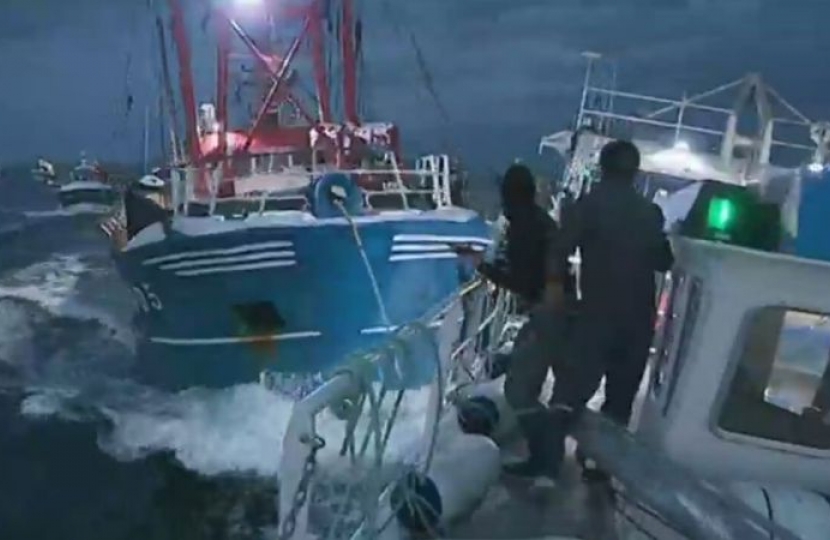Brussels came back to life this week as the European Institutions started working again after the long summer break, whilst Theresa May visited Africa as part of a post Brexit trade mission and British and French fisherman came to blows in the Channel.
It was a significant week for the Brexit negotiations. Firstly there was the announcement that the deal was not likely to be agreed until mid-November, missing the original October deadline. This will cut it very close to get the necessary parliamentary ratification on both sides of the Channel completed before next March.
Secondly both Michel Barnier and French President Emmanuel Macron made comments which suggested that the EU position may be softening on the future trade deal.
Michel Barnier stated that he wanted the closest trade deal possible with the UK, closer than that with any other country. Emmanuel Macron proposed a new EU framework altogether, one with two spheres, an inner core of EU and Euro countries and an outer core containing the UK and presumably countries like Norway, Iceland and Turkey.
Both marked a change of tone from European and particularly French politicians, who up to this stage have been decidedly cool on the prospect of close relations with a post-Brexit UK.
The Macron proposal could be particularly interesting for the UK, although it is unlikely to come in time for Brexit. Ultimately a two core Europe is probably the natural position for the UK and other non-EU European countries. In some sort of common trade area but outside of the political union. France has asked for a full discussion of all 28 EU countries (including the UK) on the future of Europe in the autumn. It remains to be seen whether this goes anywhere, but on the surface, it appears to be an olive branch to the UK and recognition that the current ever closer political union is not sustainable for the remaining EU member states on the future.
The biggest challenge with any proposal of this type is what exactly would be the trade relations for the countries in the outer core. How deep would they have to integrate? For example would free movement be expected? Would they have any say in the rules of the common market? If not it looks suspiciously like the existing EEA/ETFA rules where countries like Norway have no say in EU rules but still have to fully abide by them. Until these questions are answered this project will not go anywhere.
The focus remains on the future trade relations post-Brexit, with the UK still trying to get support in Europe for the Chequers proposals. However the future trade discussions will not dictate whether or not there is a ‘no deal’ Brexit as even in the most optimistic scenario, there will only be an outline of the future trade aspirations attached to the withdrawal agreement which is due to be agreed in November.
That outline is needed for the withdrawal deal to get through the UK Parliament, as the assumption is that British MPs will not vote for a deal which commits the UK to pay a significant amount of money without the promise of a trade deal. However it will not go beyond basic guidelines of probably no more than four or five pages. The full detail will be negotiated during the transition period after the UK has left the EU.
The withdrawal deal itself will dictate whether the UK leaves the EU with a deal (in this case a two year transition on the current rules) or if there is no deal.
It is these negotiations which aim to be finished by November. They cover mainly the divorce payment, citizens’ rights and the Irish border. They are 80% complete but two issues remain unsolved. The first is probably solvable (UK recognition of Geographic indicators like Parma ham and Champagne) but for the second (the Irish border) a solution remains elusive.
Geographic indicators (GIs) are difficult. They are of such huge importance to the EU that it insisted on including them in the withdrawal agreement despite simultaneously insisting that trade issues of concern to the UK could only be discussed at length once the UK had left the EU.
GIs were created by the EU and include things like champagne, Parma ham and Melton Mowbray pork pies. The system means only products produced from that geographical region can use the name. The UK has not been an enthusiastic adopter of these schemes, with relatively few GI’s in comparison to other countries.
However the Americans in particular hate the system, which they see as protectionist because it conflicts with the US system of trademarks. Because many North American settlers came initially from Europe there are also many North American products which use European names. To only allow Parma ham produced from Parma, Italy and not Parma, Ohio to be called Parma ham is seen to be an unacceptable barrier to trade.
The US would very much like the UK (which has always been a bit suspicious of the GI system) to move away from it. It would also help a UK/US trade deal if the UK did.
The easiest approach would be to park this issue until the trade talks start. The UK will continue to recognise GIs during the transition period, so the EU has not lost anything if these talks are delayed.
But the EU is trying to pull a fast one here. If they can get the UK to agree to future recognition of GIs before the trade deal talks start, they will have achieved one of their main offensive demands for the trade deal without having to give the UK any concession in return. For that reason the UK is unlikely to agree.
Northern Ireland however remains the biggest obstacle. Without an agreement to keep the border open there will be no deal at all, and therefore either the UK crashes out or negotiations will be extended.
The EU position remains the same, they will give the UK a free trade deal but it cannot include Northern Ireland, that has to remain in the EU single market and a customs union with a border in the Irish Sea with the rest of the UK. Either that or the UK as a whole has to stay in the customs union and single market.
The British government is unable to agree with the first option as the House of Commons explicitly voted against any divergence of rules between Northern Ireland and the rest of the UK, and would never get the second option through the same parliament, so unless the EU position changes it is hard to see how a deal can be done.
The question therefore for the EU is how far are they likely to push this. If they do not relent and accept the UK counter proposal (that in the event of no trade deal being agreed, the whole UK remains only in the parts of the internal market that relate to the Good Friday agreement) talks can go no further. The smart money suggests that they will eventually fudge the issue to ensure that Brexit does happen next March, and then aim to deal with it during the transition period rather than risk either of those eventualities.
With the member states increasingly taking over the strategy and ultimately the negotiations, a more pragmatic approach may well emerge over the next few months.
Yet if there was ever a reminder that national interest trumps everything in Europe, the English Channel provided it clearly this week when British and French fishermen clashed over fishing rights for scallops.
The clashes erupted because the French authorities impose a ban on French ships fishing in the affected waters off Normandy between May and October. UK boats are not affected and so can fish during the summer. Rather than taking their frustrations out on the French authorities, some of the French fisherman decided to attack the British ships instead. This episode shows how high emotions run on fishing issues, something which is likely to get much worse after Brexit. These clashes took place in French waters (but controlled by the EU under the Common Fisheries Policy) yet 80% of the fish caught by French fishermen are caught in British waters due to the huge size of Britain’s exclusive waters.
As the UK is keen to reclaim these waters for British vessels to fish, the next few years could be stormy!
Photo: Daniel Dalton MEP. Office: The Square, Kenilworth, CV8 1EB United Kingdom. Tel: 01926 930 683
Photo 2: British and French fishermen skirmish over shellfish



